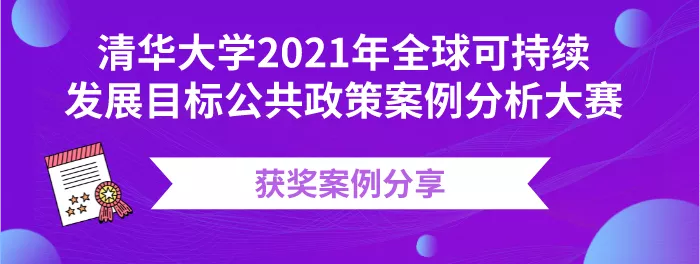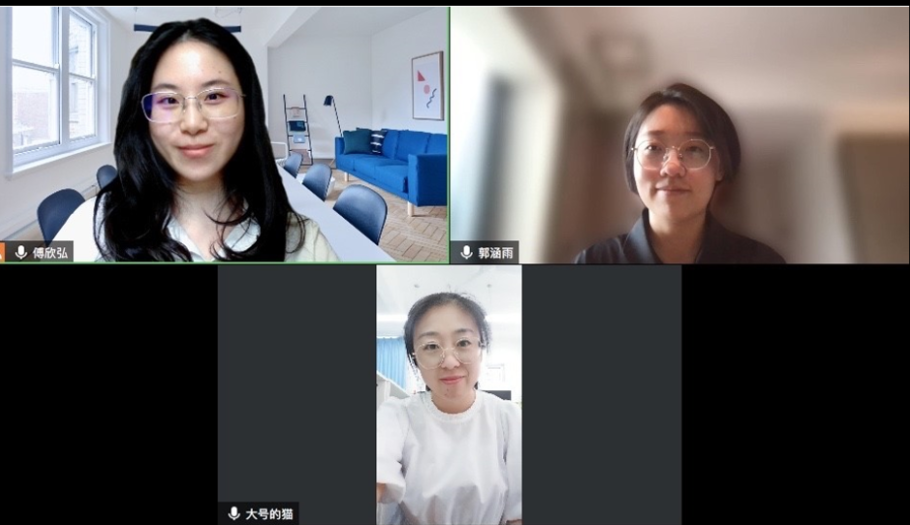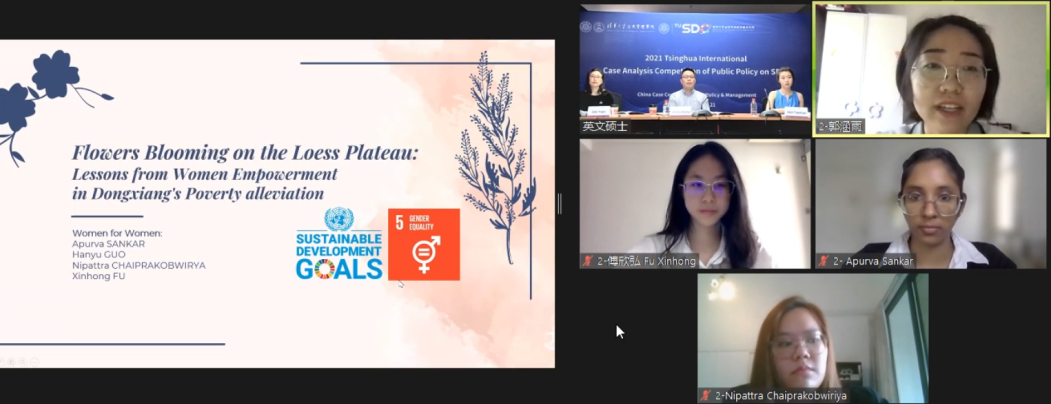
From April to August, the 2021 Tsinghua International Case Analysis Competition of Public Policy on Sustainable Development Goals (SDGs) was successfully held. This competition was co-organized by the China Case Center for Public Policy and Management at SPPM of Tsinghua University and the Institute for Sustainable Development Goals of Tsinghua University. The competition aims to encourage global students from different courtiers, cultures, universities and professional backgrounds to pay attention to SDG public policy issues, develop academic analytical skills and critical thinking abilities by discussing complex and real-life scenarios. This year’s competition attracted 49 teams from 53 universities and colleges across China, the U.S., the U.K., Switzerland, Singapore, Ireland, Australia and Germany, with a total of 147 participants. Team“Women for women” won the first prize in the graduate student competition with case analysis report "Flowers Blooming on the Loess Plateau: Lessons from Women Empowerment in Dongxiang's Poverty Alleviation".
Author
Apurva Sankar, National University of Singapore
Fu Xinhong, National University of Singapore
Guo Hanyu, National University of Singapore & University of Cologne
Nipattra Chaiprakobwiirya, National University of Singapore
Advisor
Mr. Bert Hofman,the Director of the East Asian Institute at NUS and Professor of Practice at the Lee Kuan Yew School, NUS
Keywords
Gender Equality, Women Empowerment, Poverty Alleviation Policies
Case Overview
This case study, with a focus on SDG 5: Gender Equality and Women empowerment, aims to reveal the changes brought by poverty alleviation policies to rural women, the degree to which they are empowered, and the potential obstacles and concerns by focusing on women and relative groups and organizations of Dongxiang Autonomous County, China. Located in the southwest of central Gansu Province, Dongxiang Autonomous County of Linxia Hui Autonomous Prefecture is one of the so-called "three districts and three states" (“三区三州”), which means the most deeply impoverished areas in China. Being called "the ribs of the earth", the natural environment here is harsh, with undulating mountains and crisscrossed ravines. 290,000 residents live scattered in three thousand deep gullies on mountain beams. Dongxiang has the most striking gender hierarchy in northwest China. About 88% of the population are Islamist, which advocates women to stay at home. The combination of Islam and traditional Confucianism solidify gender roles. Due to the severe environmental conditions, Dongxiang developed a single, agriculture-dominated mode that highly demands strong labor, leading to a preference for multi-child and male.
The research draws on referable international experiences and puts forward corresponding policy recommendations based on surveys and interviews. Through literature review, questionnaire surveys and semi-structured interviews, the team learned that stakeholders from varied sectors have contributed to Dongxiang’s poverty alleviation work. The development of the economy and women’s empowerment are intertwined and mutually promotive. The policy is the trigger of the development. It drives changes in the market, government institutions, informal institutions, and ultimately affects household preference, companied with preferential policies of social services to compensate for market failures. Better gender outcomes are achieved, and a new round of economic development will be triggered.
Experience Sharing
We are a cross-regional and cross-cultural team, with two Chinese members, one Thai member, and one Indian member spanning three time zones. Due to the COVID-19, we mainly work online. Although with restrictions, after four months of preparation and three rounds of competition, our teamwork is full of cohesion.
We focus on the life and development of rural women and combine women's empowerment with China's poverty alleviation work. We hope to use this as an example to explore in-depth how socio-economic and macro-policies can accommodate every group in society, including men, women, and all other groups. Through research, we propose that in order to further promote gender equality and a better inclusive environment, we should also stimulate men’s views on participating in women’s empowerment work. In addition, we believe that gender concepts should also be incorporated into the process of policy implementation and supervision, and sensitivity to gender-related issues should also be established in poverty-alleviation work. In addition to calling for the institutionalization of gender concepts and advocating inclusive and mainstream gender equality goals, how to implement gender-related strategic policies and how to enable women to participate in the entire policy process are issues that need to be resolved urgently.
By thinking about sustainable development issues from a professional perspective of public policy, carrying out field research, conducting online interviews, and writing case analysis reports, we implemented the qualitative and quantitative methods learned in our research. At the same time, we are also very grateful to the local government and interviewees for their generous support. We also thank the teammates scattered in the United States, Singapore, and China for the close cooperation with each other. We hope that the case study on women's empowerment and poverty alleviation in Dongxiang, Gansu can help everyone gain more attention and understanding of rural women’s rights, gender equality, poverty alleviation and other issues.

Interviewing the volunteer teacher in Dongxiang

Presenting in the final competition
Written by Team "Women for women"
Edited by CCCPPM

